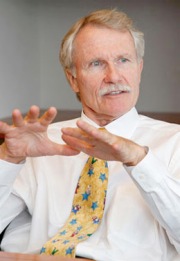“… we have the opportunity to take advantage of our momentum to grow our bicycle-related economy… I support taking a different approach to community development, making neighborhoods less dependent upon automobiles…”
— John Kitzhaber, Democratic candidate for Oregon Governor
“In order to help educate members on transportation policy issues,” the Bicycle Transportation Alliance has published responses to a questionnaire given to candidates for public office in the upcoming elections. The BTA’s Legislative Committee put the survey together and asked four questions about “critical” bike-related issues.
The questions went out to candidates for every major office in the upcoming elections including races for Governor, the U.S. Senate and House, the Oregon Senate and House, County Commissioner races throughout the state, and the race for Metro President. Of the 80 candidates that were contacted, 42 responded and 38 did not.
Here are the four questions they were asked:
1. What programs and other public policy initiatives do you support for making Oregon communities more accessible for pedestrians and bicyclists?
2. What programs and other public policy initiatives do you support for improving the safety of road users, particularly vulnerable users (e.g., better education for road users, increased penalties for unsafe vehicle operation, other statutory modifications)?
3. What programs or other public policy initiatives do you support to ENCOURAGE the use of bicycles for transportation?
4. Please list the active transportation projects, if any, in your district for which you have provided assistance or support?
The vast majority of the respondents spoke in support of bike-friendly policies.

In the Governor’s race, Republican Chris Dudley did not respond to the questionnaire, but three other candidates did. Democratic frontrunner and former Oregon Governor John Kitzhaber had the most in-depth responses. It’s clear that he’s either been paying attention or someone on his staff has educated him about the benefits of non-motorized transportation. Here are a few snippets from his answers (emphasis mine):
On policies:
“Bicycling is on the rise in Oregon and we have the opportunity to take advantage of our momentum to grow our bicycle-related economy, improve the health of our children and our natural environment, and promote quality of life in our cities, towns, and neighborhoods.”
Road safety:
“I support taking a different approach to community development, making neighborhoods less dependent upon automobiles and creating more opportunities and greater safety for transit, bicycles and pedestrians.”
Encouragement:
“… I have always supported opening up a portion of the Highway Trust Fund to support non-highway investments — particularly for public transit and other alternative modes of transportation; as well as for transportation options, including bicycles, that reduce road usage and preserve the assets in which we have already invested.”
Congressman David Wu, another Democrat, also shared some interesting answers. On road safety:
“… I believe that states should be required to make proportional investments toward reducing bicyclist and pedestrian fatalities as part of their federal safety funding allotments.”
Michael Meo, a Pacific Green party candidate for Oregon’s 3rd Congressional District (currently held by Earl Blumenauer), mentioned a “modest registration fee” for “bicyclers” and also said that “All of the Park Blocks in downtown Portland ought to be closed to motor vehicle traffic, save for a few (let us say, four) arteries allowing cars to go to the north and south across them.”
Republican Karen Bodner, running for Oregon State Senate, also mentioned “bicycle registration fees and licensing.” Pointing out that Lane County is not a bike-friendly place and that most of its citizens “prefer using their auto for timeliness and convenience” Bodner said she doesn’t believe greenhouse gas emissions are a problem. Her solution: “We should be encouraging private sector Research & Development to develop new technology that can make gas even cleaner. Our gas is cleaner than in the past, as is our air and water.”
In the Metro President race, what will likely be the most competitive and important race for the Portland region, former Hillsboro Mayor and The Oregonian-backed Tom Hughes did not respond. His challenger, former leader of land-use non-profit 1000 Friends of Oregon Bob Stacey, had this to say about road safety:
“Our main work should be focused on getting people walking and biking, because data across the world show people learn both to look for and interact safely with bicyclists and pedestrians when bicyclists and pedestrians are more frequent users of the public realm. Again, complete, accessible low-traffic routes are critical parts of helping beginning and intermediate cyclists feel and be safe.”
As a 501 (c) (3) organization, the BTA cannot endorse candidates, so this is simply an educational exercise. Read more on the BTA Blog. You can download the full report here (32 page PDF).


